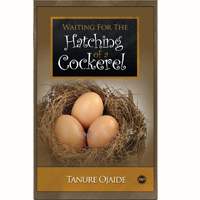|
Waiting for the Hatching of a Cockerel (2008) is Nigerian
scholar--poet Tanure Ojaide’s sixteenth collection of poetry.
Released in the United States in May by Africa World Press, Trenton,
New Jersey, the poems share with readers the voice of a sensitive
intellectual grappling with disparate strands of his own history,
existence, African-centered philosophies, and a plethora of relationships
that crisscross human and natural conditions. In these poems Ojaide
treats his readers to serious issues, using sophisticated language
and lines reminiscent of the kind of poetry his readers associate
with his opus, which is chiefly responsible for his numerous awards
that include the Commonwealth Poetry Prize for the Africa Region
(1987), the All- Africa Okigbo Poetry Prize (1988 and 1997), and
the BBC Arts & Africa Poetry Award (1988).
A neo-epic in form, the thirty-six-section poem illustrates the
poet’s vision and brilliant execution of metaphors, proverbs,
and imagery embellished with cultural material, orature, and a heightened
awareness of form. In this book Ojaide remains loyal to his signature
style of poetry. His sense of history, unobtrusive invocation of
memory, and ever-present inkling that “there’s no end
to the possibilities of hope” are lessons woven into each
poem in this book. In the title poem, “Waiting for the Hatching
of a Cockerel,” two couplets present the lament of the accomplished
and concerned African intellectual as he announces: “We have
earned terminal degrees in patience / now we wait for the hatching
of a cockerel / that will wake the land early enough / to meet the
day’s multiplying demands.” Such foresightedness and
visionary address is characteristic of Ojaide’s poetic voice,
which unrestrainedly comments on issues such as nation-building,
the laxity of Africa’s ruling class, and the human aspects
of failed leadership.
In this collection Ojaide embraces wholeheartedly his African culture,
acknowledging the wisdom of its peoples, and describing the significant
role of Aminogbe, a traditional minstrel whom he presents as a protagonist
fighting on the side of good against evil in “the new wars
which are no longer only physical but multi-faceted in nature”
(vii). Aminogbe, the self of the poet, journeys in the vignettes
in the company of Aridon, memory god among the Urhobo, the poet’s
ethnic group. At the crux of the concerns of Ojaide’s minstrel
are issues such as women’s rights, minority rights, the struggles
for a clean environment, multinational sensitivity to local people
in their business dealings, and the rights of people to be treated
as humans. The themes of forewarning and caution are strongly woven
in Aminogbe’s chants. In the poem “Fatalities,”
we sense these motifs as Ojaide’s minstrel brazenly warns
about today’s scourge, possibly AIDS:
Planted in the soil, these heads
Won’t grow—unlike pieces of yam.
Don’t blame the overbearing sun
Or faint stars, nor the voracious earth;
The cemetery devours adjoining streets
And the living have only a short time
To wait for their inevitable turn (98).
In other poems in the collection, we
sense Ojaide’s insistence on educating his reader on what
strengthens the poet’s relationship with the muse and how
that relationship is calibrated in terms of production. Again, Ojaide
achieves his message by invoking Aminogbe, who addresses his audience,
My voice is not a honeycomb.
I pick materials free
From the street’s deluge of resources
Into a mobile workshop, where
I am a hundred professorial aesthetes
Revising tongue-tied words
Into a monodic chord (124).
Meticulously built around memory and
high-level craft, Waiting for the Hatching of a Cockerel
is also stylistically more ambitious than Ojaide’s earlier
works. Gone are the over-dependence on numbered sections and the
abundant use of traditional verse. Now freer in his experimentation
with form, Ojaide’s images are sharper here, and several of
the poems address dead heroes, rituals of living, hope for the future,
and love.
In “Dirge I,” the poet remembers dead heroes in Nigeria’s
political landscape whose demise continues to germinate questions
for intellectual discourse, and the victims of nationwide turmoil/deaths
that could have been avoided, wondering what might have become of
them if they had taken a safer route to avoid their fates as he
chants in the couplets,
Comes Aper Aku---
If the Niger and the Benue had not met
Comes Dele Giwa—
If he had dined with the devil with a longer spoon
Comes Claude Ake---
If planes were powered by genius and not fuel
…………………………………
Comes casualties of communal clashes---
If nobody worried about land in Warri
Comes casualties of religious clashes---
If there was not only one God
To expand the scope of his topicality,
Ojaide shares his hope for the living and encourages the possibilities
in risking generosity to make new friends or find one’s way
out of the hardships of life in the poem “New Life,”
where he stresses:
Take in the stranger at the doorstep---
Don’t for fear of robbers let him die;
Give him a bowl to drink from,
Share what the family can afford;
He could be the god you have
Been praying to for safe travel;
He could be the one out there
Sent to help you out of a trap.
“Nobody knows his helper,”
Aminogbe tells his listeners; (145)
In the poem “Love Song,”
Ojaide draws the reader into an intimate relationship he shares
with his past, using language that is colorful, lyrical, and passionate
to examine the many dynamics of love’s interconnectedness.
When he admits, “Though hard to bear / the iroko is rooted
in this chest,” we sense the strong appeal the home front
still has on the traveler. And when he confesses, “Let no
one doubt this bond in communion / Obinomba, Sokoto, and Warri provided
me / with all I needed to grow strong to survive / armies of devilries---love
cannot be deeper,” we sense the role cities and places played
in nurturing the poet’s growth and development into an adult
wiser and grateful to the resourcefulness of his Nigerian home.
In all its simple tenor and niceties as a book of poetry, Waiting
for the Hatching of a Cockerel (2008), dedicated to the poet’s
grandmother, Amreghe, and Ken Saro-Wiwa, sheds light on the poet’s
identity and alerts his reader of the myriad of events, human conditions,
and historical ruminations that shape his personal landscape and
political vision. The landscape of the natural world—of water
and rivers and sea and earth and mountains—are quite rich
in these poems. Without a doubt, I will recommend this book for
those familiar with Tanure Ojaide’s prolific writings and
those encountering the brilliance of his poetry for the first time. |
|
|


Dike Okoro,
poet, short story writer, essayist, sculptor,
and photographer, is author of the poetry collection, Dance
of the Heart (ABC/MSU Press, 2007) and the editor of the
poetry anthologies, Songs for Wonodi (ABC/MSU Press, 2007)
and Echoes from the Mountain: New & Selected Poems by Mazisi
Kunene (Malthouse/MSU Press 2007). He is a Sam Walton Fellow
with SIFE’s USA chapter and a doctoral degree in literature/creative
writing candidate at the University of Wisconsin at Milwaukee,
USA
|
|
|











![]()
![]()


